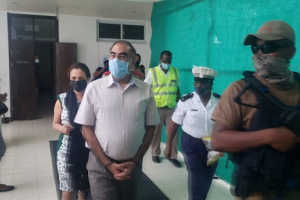Sensors start tracking Seychelles’ ocean space – California-based Scripps Institution spearheads study of the western Indian Ocean

Seychellois fishermen bringing in their catch at Beau Vallon bay, Mahe island. Understanding the ocean is of utmost importance for coastal nations such as Seychelles that rely heavily on oceanic resources. (Gerard Larose, STB)
(Seychelles News Agency) - The movements of the ocean may be a mystery to most, apart from the seasoned seafarer, but scientists are hoping to get a better understanding of the dynamics of the currents and monsoonal cycles which are the subject of a US-led study by Scripps Institution of Oceanography focusing on the ocean environment in the Indian Ocean basin.
Part of the study is taking place in the exclusive economic zone of the Seychelles islands, off the coast of East Africa where a locally based NGO - Better Life Foundation (BLF) is collaborating in the study on behalf of the Seychelles government.
The first four sensor-equipped buoys that will help gather the necessary data were deployed on October 28 by the Seychelles Coast Guard.
In an email interview with SNA, Scott Katz, an oceanographer working at Scripps Institution of Oceanography who is leading the project, said data collecting began immediately after the sensors were deployed and that it will continue throughout the buoys’ operational life of approximately six months.
“The frequency of in situ reports can vary, but for our initial assessments the wave buoys are reporting every three hours via satellite communications. The physical measurements provide immediate insight to the state of the ocean,” said Katz.
“The longer we study, the more data we can collect, the more robust the results are. Time series data from in situ sensors will be collected over multiple seasonal monsoonal cycles to aid in our investigation of the linkages among the regional currents and the larger basin circulation.”
The main goal of the investigation is to improve the understanding of the physical air-sea exchange processes and understand surface current dynamics in the tropical western Indian Ocean.
Katz told SNA that the ocean and atmosphere are inexorably linked hence anomalies in one region of the world will propagate in the ocean and atmosphere around the world.
“As we improve our understanding of the physical processes affecting the regional currents in the tropical western Indian Ocean, our ability to forecast conditions will improve. Through a better understanding of the local circulation in Seychelles waters there is a context for understanding local changes in fisheries,” said Katz adding that the study will also indirectly support other areas such as tourism and the economy in general as it provide an improved understanding of the environment.
Scripps is undertaking similar studies like the one that just started in Seychelles in the Bay of Bengal in the Indian Ocean and in the western Pacific Ocean.
 |
| The ocean and atmosphere are inexorably linked hence anomalies in one region of the world will propagate in the ocean and atmosphere around the world. (Scott Katz) Photo License: All Rights Reserved |
Understanding the ocean is of utmost importance for Seychelles as a coastal nation
The Better Life Foundation is in its second year of existence.
Its Chairman Marco Francis who is also the Chairman of the Seychelles Chamber of Commerce and Industries (SCCI) told SNA that for Seychelles as a coastal country, the understanding of the ocean cannot be overlooked, as it is heavily dependent on fish for its daily consumption.
“As a country we are promoting the concept of the blue economy and it is important for us to fully understand all aspects of this amazing resource which our ocean space represents,” he said and added that the findings of the study will help government “define fact based policies for the harnessing of the national EEZ to propel economic development.”
Apart from the Better Life Foundation and the Seychelles Coast Guard, the Scripps Institution of Oceanography is also hoping to engage local fisherman and commercial ships that depart Seychelles’ Port Victoria in the deployment of sensors for the two year study.
 |
| Four sensor buoys deployed since October 28 are reporting every three hours via satellite communications. (Scott Katz) Photo License: All Rights Reserved |
“During phases of this multi-year investigation, staff from both institutions may visit, when appropriate, to discuss preliminary results and opportunities for expanded collaboration to optimize this investigation,” said Katz.
Once completed the study’s data will be analyzed and the findings remitted to the BLF which will in turn hand it over to the Seychelles government.
“Such a partnership is very significant for our country and carrying out specialized studies is costly and as we don’t have neither the personnel nor the resources to do it alone. For this reason I am extremely grateful to the Scripps Institute for committing to this project which will help us in our efforts to attain sustainable development,” said Francis.
Study opportunity for Seychellois at the Scripps Institution
As part of an agreement BFL signed with the Scripps Institution last year, there is a possibility to obtain one or two fully funded scholarships for Seychellois students to study oceanography at the institute.
“We are a coastal state with vast ocean space. If we are to truly harness the full potential of that ocean we have to train our youths to be able to understand them so that we can make long term sustainable plans for our country’s development,” Francis explained.
Scripps Institution of Oceanography – at the University of California in San Diego is one of the oldest, largest, and most important centres for ocean, earth and atmospheric science research, education, and public service in the world.
Research at Scripps encompasses physical, chemical, biological, geological, and geophysical studies of the oceans, earth, and planets.
According to the Scripps website, its undergraduate and graduate programs provide transformative educational and research opportunities in ocean, earth, and atmospheric sciences, as well as degrees in climate science and policy and marine biodiversity and conservation.





